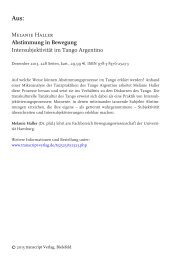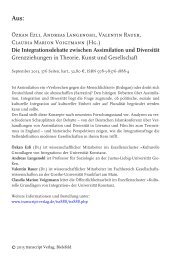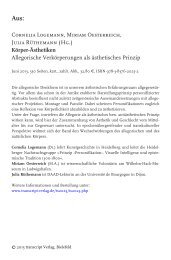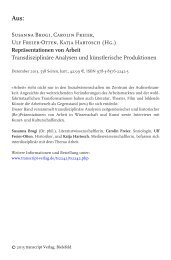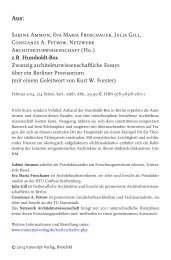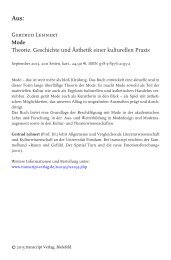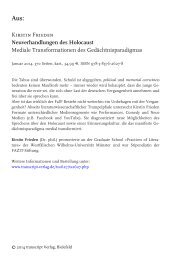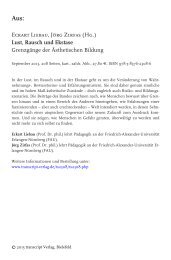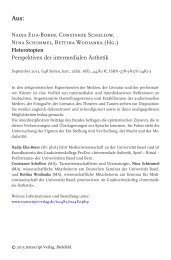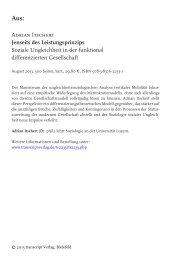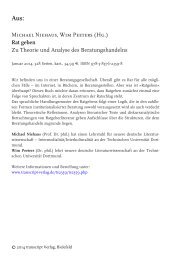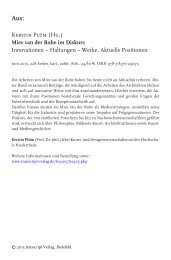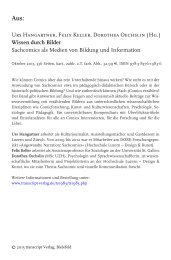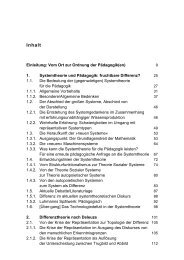Rainer Geissler, Horst Pöttker (eds.) Media ... - transcript Verlag
Rainer Geissler, Horst Pöttker (eds.) Media ... - transcript Verlag
Rainer Geissler, Horst Pöttker (eds.) Media ... - transcript Verlag
Create successful ePaper yourself
Turn your PDF publications into a flip-book with our unique Google optimized e-Paper software.
<strong>Horst</strong> <strong>Pöttker</strong> | Successful Integration?<br />
between Polish men and German women, subscribing to and reading German<br />
newspapers. In a word, they were against all the various forms of intercultural<br />
communication and contact between the Polish minority and the German<br />
majority in everyday life (Cf. Der Polizei-Präsident, Abt. II.: Übersetzungen<br />
aus westfälischen und anderen polnischen Zeitungen. Jg. 1912, No. 41, 11.<br />
Oktober 1912, p. 383ff).<br />
Moreover, their reporting provides further substantiation that there was a<br />
significant amount of further migration of Poles to Lorraine prior to World<br />
War I. On October 9th, 1912 the Viarus Polski published the following<br />
“warning”:<br />
22<br />
Many Poles, especially from Silesia, leave their homes for France<br />
without prior information. But what is waiting for them there is<br />
misfortune, as the French mines only employ workers from the<br />
Rhineland and Westphalia. Salaries are not higher than in Westphalia.<br />
But, since we are allowed Polish teachers and Polish pastors, freedom<br />
of speech is granted. Also, the clubs are allowed every freedom they<br />
require. (…) Work is not so harmful to health, as the coal is free of<br />
gas. But the salary fluctuates. (Der Polizei-Präsident, Abt. II.:<br />
Übersetzungen aus westfälischen und anderen polnischen Zeitungen.<br />
Jg. 1912, No. 41, 11. Oktober 1912, p. 388)<br />
This quote clearly indicates that the further migration of Poles to France and<br />
the failure of their integration into German society were linked to the pressure<br />
to assimilate that they had had to face in Germany. The Roman Catholic<br />
Polish nationalism of the newspapers mentioned can also be understood as a<br />
reaction to the pressure to assimilate brought forward from the German side.<br />
It is not without a certain irony that in German-language research contexts<br />
all of the statements about the Polish ethnic press – those made by Christoph<br />
Kleßmann and others, and even the assertions in this paper– are based on the<br />
historical translations of the German authorities. These translations were<br />
probably not inauthentic, although this possibility should also be taken into<br />
consideration.<br />
What is more disturbing than the philological accuracy of the texts is their<br />
selection. It is possible that the apparently strong nationalist tendency of the<br />
successful Polish newspapers Viarus Polski and Narodowiec would prove to be<br />
less prominent, if recourse were taken to the Polish originals instead of to the<br />
selective translations. In this regard, a great amount of intercultural content<br />
analysis remains to be done.



